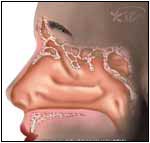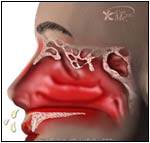|
|
 | |
Hay
fever
|
 |

Normal |

Abnormal |
| |
-
Inhaled allergens (materials that are foreign to the body) such as pollens, molds, or dust trigger an abnormal response by the body's immune system (protective cells and Proteins known as
antibodies that
attack foreign invaders), specifically, allergins trigger IgE
antibodies, which attach to mast cells. Mast Cells are
specialized cells that release inflammatory products. These
inflammatory products produce the symptoms that occur with
allergic rhinitis. Symptoms occur seasonally or year-round,
depending on the allergen.
|
 |
- Nasal Congestion
- Sneezing
- Watery eyes
- Eye irritation
- Eye itching
- Headaches
- Pressure in the cheeks
- Wheezing
- Impaired sense of smell
- Sore throat and coughing may
occur
|
 |
- Pollens
- House dust
- Dust mites
- Mold spores
- Grasses
- Ragweed
- Animal products -- urine, saliva,
hair, skin debris
|
 |
- Possible findings on examination:
- Swollen and pale or purple
turbinates (inside the nasal cavity)
- nasal polyps
- Tenderness above eyes near bridge
of nose or over cheeks.
- Wheezing in chest
- Complete blood count
- Skin allergy testing
- Serum RAST testing
|
 |
- Avoidance of allergen is best:
- If you are suffering from an environmental allergen
-- stay indoors, use air conditioners
or air filters.
- If caused by animals, keep pets
out of bedroom or remove animal from the home.
- If caused by mold spores, keep
bathroom areas clean of mold and repair all leaks.
- Use flooring in place of carpets, dust frequently, and
using dust-proof material, furniture, and bedding can reduce
house dust/house mites.
- Antihistamines -- over the counter such as Benadryl are effective, but tend to cause drowsiness. Newer prescription medications such as Claritin and Allegra are less
likely to cause drowsiness, but are more expensive.
- Nasal corticosteroid sprays
- Cromolyn Sodium nasal sprays
- Antihistamine nasal sprays
- Decongestants such as
Pseudoephedrine
- Ibuprofen may help with
associated headaches.
- Prednisone in a tapered dose
- Medrol dose pack
- Kenalog (Triamcinolone injection) -- corticosteroid
injection gives 4-6 weeks of relief, but can have long term
side effects if given too frequently
- Desensitization therapy also known as "Allergy Shots" --
very small amounts of allergen are injected, slowly
increasing the dose over time in order to desensitize the
body.
|
 |
|
| | |
If you want your friend to read or know about this article, Click here
 |
|
|

